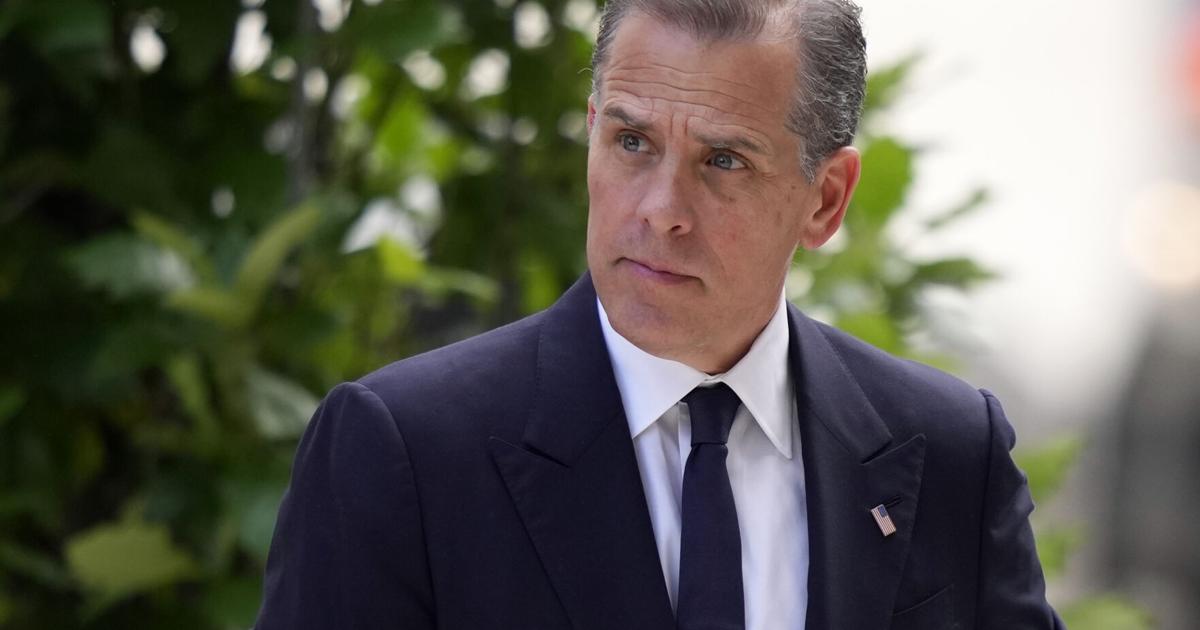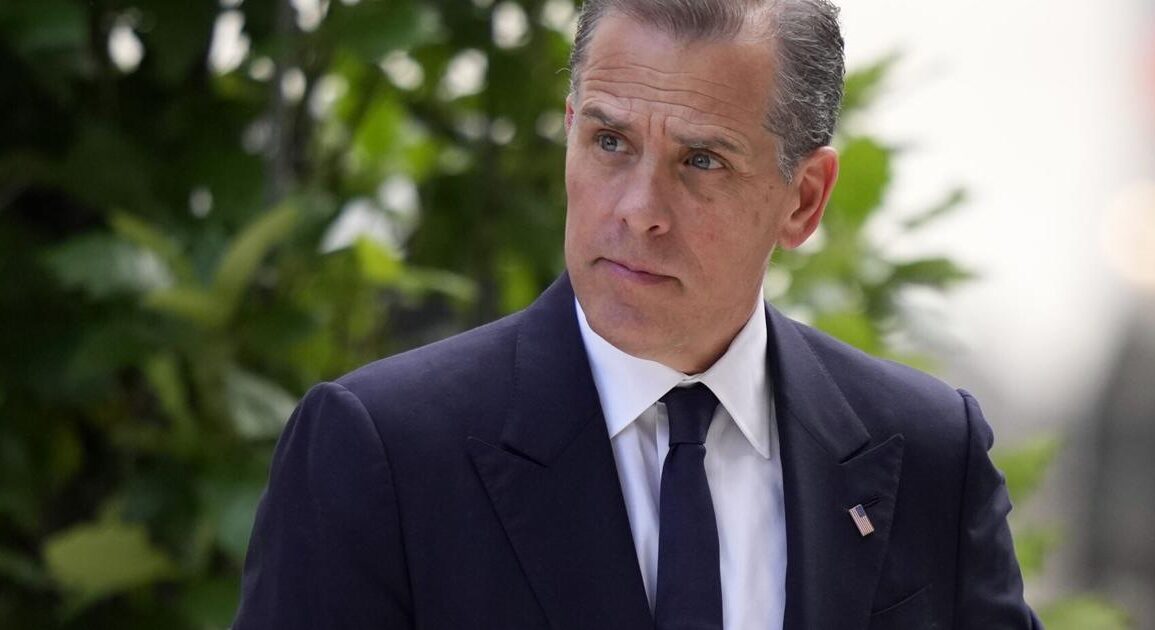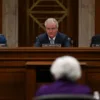
WILMINGTON, Del. – A federal gun case against President Joe Biden’s son Hunter opened Monday with jury selection, following the collapse of a plea deal that would have avoided the spectacle of a trial so close the 2024 election.
First lady Jill Biden was seated in the front row of the courtroom, in a show of support for her son.
In a statement, the president said he has “boundless love for my son, confidence in him, and respect for his strength.”
“I am the President, but I am also a Dad,” he said, adding that would have no further comment on the case. “Jill and I love our son, and we are so proud of the man he is today.”
Hunter Biden, who spent the weekend with his parents, has been charged in Delaware with three felonies stemming from a 2018 firearm purchase when he was, according to his memoir, in the throes of a crack addiction. He has been accused of lying to a federally licensed gun dealer, making a false claim on the application used to screen firearms applicants by saying he was not a drug user, and illegally having the gun for 11 days.
He has pleaded not guilty and has argued he’s being unfairly targeted by the Justice Department, after Republicans decried the now-defunct plea deal as special treatment for the Democratic president’s son.
The trial comes just days after Donald Trump, Republicans’ presumptive 2024 presidential nominee, was convicted of 34 felonies in New York City. A jury found the former president guilty of a scheme to cover up a hush money payment to a porn actor to fend off damage to his 2016 presidential campaign. The two criminal cases are unrelated, but their proximity underscores how the criminal courts have taken center stage during the 2024 campaign.
In Delaware, prospective jurors who answered “yes” on a questionnaire were quizzed individually by Judge Maryellen Noreika to determine whether they could be fair and impartial. One by one, they were dismissed, winnowing down the pool.
The questions ranged from their knowledge of the case to their thoughts about gun ownership and whether they or anyone close to them have struggled with substance abuse or addiction or ever owned a gun. Other questions focused on the role politics may have played in the charges.
One prospective juror said she didn’t know whether she could be impartial because of the opinion she had formed about Hunter Biden based on media reports.
“It’s not a good one,” she replied when an attorney asked her opinion. Another prospective juror was dismissed because his family has a long history in law enforcement, and he said he could not be impartial. A third was excused because he was very aware of the case, and, “It seems like politics is playing a big role in who gets charged with what and when.”
Only one potential juror answered “no” to all the questions and moved on to the next phase. Another who was not dismissed said he holds a concealed carry permit and owns three handguns. The man said he has strong views on gun ownership and believes every law-abiding citizen should be able to own a gun.
“I believe the Second Amendment is very important,” he explained.
Attorneys jointly moved to dismiss a woman who expressed strong anti-gun views during questioning.
“I would like stronger laws in this country about certain types of weapons,” she said. “The ones with high repeat, you know, that kill children in schools.”
The woman also said the government should require more background checks and make it harder to get a gun “that can kill a lot of people at once.”
“I would ban them altogether to be honest,” acknowledged the woman, who also said she has donated to Democratic congressional candidates around the country and joined “one of the resistance groups” after the 2016 election.
Hunter Biden also faces a separate trial in California in September on charges of failing to pay $1.4 million in taxes. Both cases were to have been resolved through a deal with prosecutors last July, the culmination of a yearslong investigation into his business dealings.
But Noreika, who was nominated to the bench by Trump, questioned some unusual aspects of the deal, which included a proposed guilty plea to misdemeanor offenses to resolve the tax crimes and a diversion agreement on the gun charge, which meant as long as he stayed out of trouble for two years the case would be dismissed. The lawyers could not come to a resolution, and the deal fell apart. Attorney General Merrick Garland then appointed the top investigator as a special counsel in August, and a month later Hunter Biden was indicted.
This trial isn’t about Hunter Biden’s foreign business affairs — which Republicans have seized on without evidence to try to paint the Biden family as corrupt. But it will excavate some of Hunter Biden’s darkest moments and put them on display.
The president’s allies are worried about the toll the trial may take on the elder Biden, who’s long been concerned about the well-being and sobriety of his only living son and who must now watch as his son’s painful past mistakes are publicly scrutinized.
Allies are also worried the trial could become a distraction as the president tries to campaign under anemic poll numbers and as he is preparing for an upcoming presidential debate while the proceedings play out.
Hunter Biden arrived first to the Delaware courthouse on Monday. The first lady, who turned 73 on Monday, followed about 15 minutes later and walked briskly into court, flanked by U.S. Secret Service agents. Hunter Biden’s sister Ashley Biden was also in court, and his wife, Melissa. The president was in Wilmington until he left for a campaign reception in Greenwich, Connecticut.
The case against Hunter Biden stems from a period when, by his own public admission, he was addicted to crack. His descent into drugs and alcohol followed the 2015 death of his brother, Beau Biden, from cancer. He bought and owned a gun for 11 days in October 2018 and indicated on the gun purchase form that he was not using drugs.
Defense attorneys have suggested they may argue that Hunter Biden didn’t see himself as an addict when prosecutors say he checked “no” to the question on the form. They will also attack the credibility of the gun store owner.
If convicted, Hunter Biden faces up to 25 years in prison, though first-time offenders do not get anywhere near the maximum, and it’s unclear whether the judge would give him time behind bars.
Long reported from Washington. Associated Press Writer Alanna Durkin Richer in Washington contributed to this report. Follow the AP’s coverage of Hunter Biden at https://apnews.com/hub/hunter-biden.



